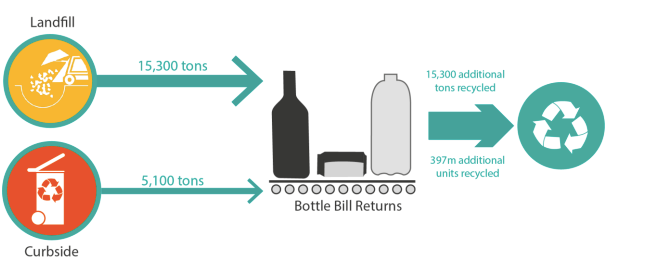Our most successful recycling program
Thanks to the Bottle Bill, we recycle more than 75% of covered beverage containers, while only recycling about 36% of other containers.
We’ve fought for years to protect and expand Vermont’s Bottle Bill, and have celebrated some important victories along the way. But there’s more to be done.
By modernizing the Bottle Bill to cover additional beverages like bottled water and wine bottles, we can keep an estimated 100 million more bottles and cans out of Vermont’s landfills and off our roadsides every year.
VPIRG is working to modernize the Bottle Bill to cover non-carbonated beverages like bottled water, wine, and sports drink containers.
Check out the links below to learn more about our Bottle Bill work.
Why Should We Modernize Vermont’s Bottle Bill?
1. Increase Recycling

The scope of Vermont’s container deposit law has not kept pace with the wide range of beverages on the market. Currently, only 46% of beverage containers purchased in Vermont are covered by the Bottle Bill. Maine’s law covers over 90% of beverages there. By updating the scope of the Bottle Bill to include most non-carbonated beverages, Vermont will be able to capture more containers through its proven and effective deposit return system.
The updated Bottle Bill will capture bottles that would otherwise be needlessly landfilled. Plastic bottles are the second most common item littered in Vermont, and water bottles – which do not have a deposit – are the single most popular type of beverage sold in plastic in Vermont. Nationally, only 17% of PET plastic bottles without a deposit are recycled, compared with 57% of PET plastic bottles with a deposit.
2. Improve Recycling
Bottle Bill material is clean and valuable enough to consistently recycle bottles into new bottles. On the other hand, our curbside blue bin recyclables are often too contaminated to be turned into new bottles again.
A large portion of single-stream glass recycled in Vermont is downcycled into construction materials and road aggregate. By contrast, virtually all Bottle Bill glass in Vermont is recycled into new high-quality products. When materials from our single stream facilities are sent to be recycled, it takes much more energy to turn them into new products due to the contamination and some of that material must be landfilled out of state.
Bottles are part of a well-established, closed-loop recycling system, where they can be efficiently recycled over and over. When we downcycle it, we are moving from a circular to a linear system where those products will not be recycled again. The greatest benefits of recycling come from the closed loop system – we use fewer virgin materials which means water, energy, and greenhouse gas savings, and reduced air pollution.
A modernized Bottle Bill further benefits the circular economy when accompanied by recycled content standards, which ensure that any bottle sold contains a minimum amount of recycled plastic. Industry experts maintain that Bottle Bills are essential to meet current demand for recycled content, but there is still not enough clean, recycled material to meet mandates passed by states like California.
3. Producers – Not Taxpayers – Cover the Cost
The Bottle Bill works under an Extended Producer Responsibility – EPR -model, where the producer (instead of the consumer) is responsible for the financial and administrative burden of managing the material it creates -throughout its life cycle. This system recognizes that manufacturers can no longer be let off the hook for the waste that they generate. This way of thinking has gained a lot of attraction in recent years because of the worldwide focus on plastic waste.
Research in VT tells us that plastic bottles are the #2 source of litter in the state. By putting a small bounty on each beverage container, we also ensure that there will be less litter. Given the immensity of our waste crisis, we need to move all our waste systems towards EPR and strengthen and protect our existing EPR systems.
4. Consumer Convenience
H.158 includes several important provisions increasing redemption access for Vermonters. It requires at least three redemption centers per county and at least one per municipality with a population of 7,000 or more. Furthermore, redemption centers will be sited in areas that are still unserved by a redemption center and in designated downtown districts.
These improvements to consumer convenience are essential for equity and will significantly improve the operation of the Bottle Bill system.
Furthermore, expanding the Bottle Bill will create more consistency: consumers don’t know why hard cider doesn’t have a deposit while beer does when they have the same packaging and are sold next to each other in the store. Similarly, consumers can redeem liquor and beer but not wine.
5. Boost Vermont’s Economy
Redemption centers, many of which faced financial stress before the pandemic, are particularly vulnerable to the workforce stresses that have occurred over the last couple of years. In order to have functioning and profitable redemption centers, we need to update the Bottle Bill to reduce the burden on these small businesses and increase the volume of containers they receive. H.158 includes a variety of mechanisms intended to do so.
Furthermore, small and medium retailers with stores under 5,000 square feet will be automatically exempted from participating in redemption; several of these small retailers have testified that these changes would provide relief.
As of 2019, all the unclaimed nickels from bottles that are not redeemed go back to the State to fund clean water initiatives. A modernized Bottle Bill will bring in more cash flow to the State for clean water and ultimately will fund other significant environmental causes.
